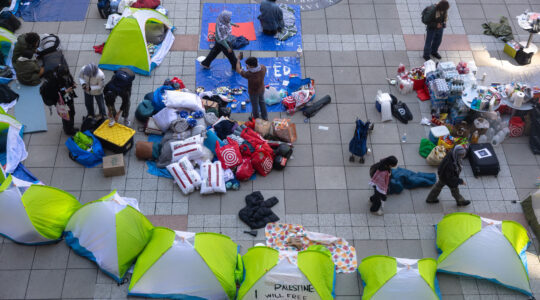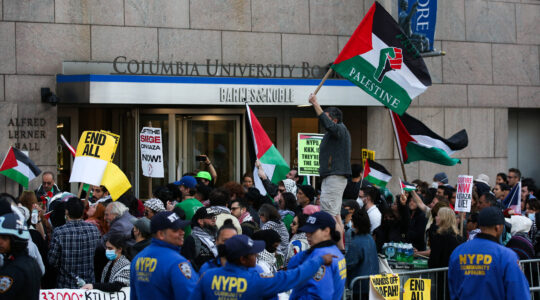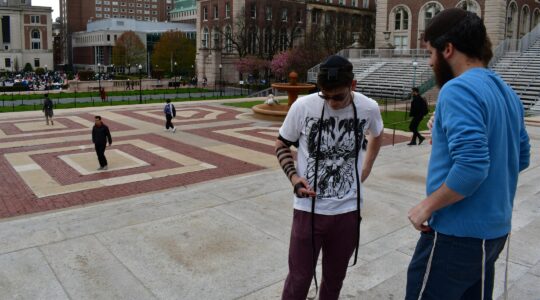NEW YORK – One of the Jewish calendar’s most widespread and public observances, the Chanukah holiday has traditionally emphasized two miracles: the military victory of Jewish rebels over Greek invaders, and the one vial of oil that lasted for eight nights
But just as other holidays have seen their historic purpose shaped to contemporary narratives, Chanukah is increasingly being used as a vehicle for other Jewish agendas that seem to stray far from the holiday’s original meaning.
This year, much of the focus is on global warming. The Shalom Center, a Philadelphia-based group focused mainly on environmental issues, has launched the Green Menorah Covenant campaign to promote improved energy efficiency among Jewish communities. The campaign, which is timed to coincide both the Chanukah and a U.N.-sponsored conference on climate change in Bali, Indonesia, follows a similar effort, begun last year, to encourage switching to more energy-efficient light bulbs.
“A Light Among the Nations,” a project of the Coalition on the Environment and Jewish Life and the Jewish Council for Public Affairs, aims to get Jews to switch to compact flourescent light bulbs during the holiday. This year, the program is being tied to JCPA’s anti-poverty campaign, which in December will focus on energy.
The JCPA was also involved in the creation of Ner Shel Tzedakah (“candle of righteousness”), a joint initiative of the Reform and Conservative movements that aims to teach about poverty by encouraging families to donate their holiday gifts to organizations assisting the poor.
The most famous figures of the Chanukah story, the mythic Maccabees, have been appropriated as symbols of Jewish sport – no small irony considering the Maccabees rebelled against the worship of athletic prowess that characterized Hellenistic civilization.
And on the shabbat that falls in the middle of Chanukah, on Dec. 8, rabbis are being encouraged to tie their sermons to the struggle for Soviet Jewry, which is marking its 40th anniversary this year.
Jeffrey Gurock, a history professor at Yeshiva University and author of a book about Judaism’s encounter with sports, says that sports teams should more aptly be called the “anti-Maccabees.” The shift in thinking about the Maccabees, Gurock said, is linked to the Zionist thinker Max Nordau, who sought figures in Jewish history as models for what he called “muscular Judaism.”
“It was an appropriation of a particular moment in ancient Jewish history that’s revived and used in modern times,” Gurock sad. “Jews were fighters in the ancient world. And they want to go back to this image of Jews.”
Indeed, Chanukah has more to do with ancient miracles than with environmentalism or concern for the poor. The holiday marks the victory of Maccabean rebels against their Hellenistic rulers in the second century BC and the subsequent miracle of the temple oil lasting for eight days.
Rabbi Leon Morris, executive director of the Skirball Center for Adult Jewish Learning in New York, says he has no problem with added layers of meaning being added to the Chanukah story provided it doesn’t eviscerate its underlying themes.
“I think every holiday gives us an opportunity to look for contemporary resonance of the holiday’s themes in our lives,” Morris says. “The roots of Chanukah, are sufficiently complex to open up a variety of contemporary issues to weave into our own understanding.”
Morris also noted some further ironies in the contemporary American celebration of Chanukah. The holiday, which invites thinking about the tension between Jewish particularism and Hellenistic universalism, is played out against the backdrop of the dominant culture’s celebration of Christmas. Chanukah’s timing to the winter solstice, Morris speculated, may also imply something about non-Jewish influence on the holiday.
“I guess the question we should ask is not whether these interpretations are legitimate, but what’s prompting them,” Morris said. “As contemporary Jews look at the liturgy, narratives and stories, what is it that’s sparking these different sorts of ideas?”
In the case of poverty, the spark was in part mounting concern over the growing commercialization of the December holiday season.
“Our thinking was to raise the profile of the issue of poverty,” said Rabbi Marla Feldman, director of Commission on Social Action of Reform Judaism. “I think a lot of families these days are feeling overwhelmed by the consumerism that has become a focus of the holiday.”
Grafting a concern for the environment on to Chanukah celebrations is clearly motivated by the contemporary awareness of climate change and its related risks. But as many note, it may not be such a stretch of the imagination to see resource conservation as, albeit a lesser, moral of the Maccabbean tale.
Rabbinic tradition, with its reluctance to glorify military triumphs, emphasized instead the miracle of the oil lasting for eight days and it’s but a short leap from rescuing a lone vial of oil to preaching the necessity of conserving natural resources.
“It’s substantively a part of the holiday because there was a time when we really needed to have a little energy go a long way. And we call that time Chanukah,” said Rabbi Steve Gutow, executive director of JCPA. “By the same token, we think we’re at a time in our world history where we need to conserve and husband our energy.”
Likewise, Gutow says Chanukah also recalls a time when the Jewish community was poor in resources. “It was a time when we were at a nadir of our ability to find energy and to use it,” he said. “And it ties in well to the difficulties that poor Jews and poor Americans have. It makes perfect sense to me.”





